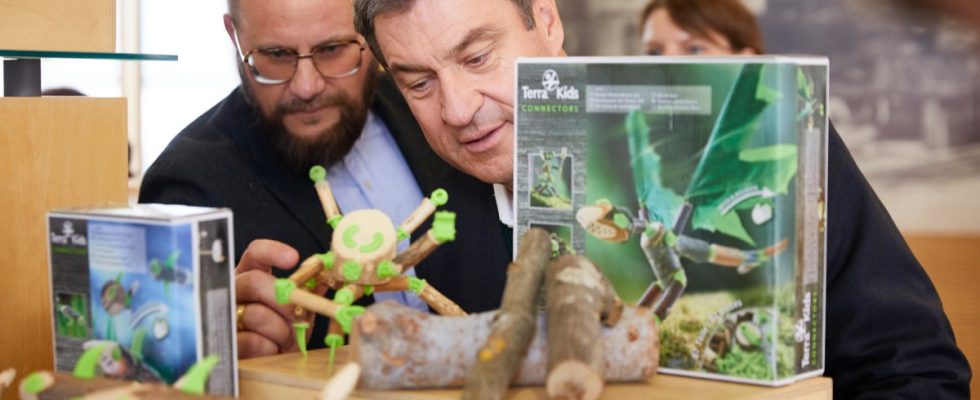A picture from better daysWhat did you notice as a career changer? “The fact that there are hardly any women in management positions in the toy industry, even though it is mainly women who buy toys,” says Stefanie Frieß. On top of that, she wonders “why emotions hardly play a role here, even though we sell very emotional products”https://www.sueddeutsche.de/wirtschaft/.”Here”, that was the world’s largest toy fair in Nuremberg last week, where Frieß and their managing director colleague Mario Wilhelm received visitors in Hall 3 at the trade fair stand of the ailing company that the two are supposed to get back on track: the insolvent wooden toy manufacturer Haba. And women as a target group and emotions should play a role.
Mario Wilhelm, 38, has a doctorate in law, has been working in the family business based in Bad Rodach, Franconia, since 2005 and was promoted to management in May 2023. Stefanie Frieß, 46, has only been working at Haba for a year and a half and has been responsible for sales and marketing in the management since June 2023. The mother of four sons’ previous positions were at the sporting goods giant Adidas and Cybex, a manufacturer of child seats and strollers. So Frieß is not an industry insider; However, the unbiased view of a career changer can’t do any harm when a traditional manufacturer has made such a disastrous mistake as Haba.
Half the staff, half the product range
In mid-September, the family business founded in 1938 (Haba is an abbreviation for the founding and owner Habermaass family) filed for self-administration bankruptcy; The process is expected to run until the end of February. In December, the company almost halved its workforce to just under 1,000 employees. 700 jobs were cut, with around 200 people quitting on their own initiative. The others ended up in a transfer company. In the previous months, Haba had already closed a highly regarded digital workshop with a representative office in Berlin and decided to end Jako-o, an online mail order company for children’s clothing. A children’s furniture factory in Eisleben was sold. All of this happened out of sheer necessity, because business was really plummeting. After 353 million euros in sales in 2021, it is expected to be 150 million this year. In 2023, Haba posted a double-digit million loss.
Recently, hardly anything worked in Bad Rodach. Dealing with a new SAP system turned into great chaos, and retailers often waited months for ordered goods. Wilhelm and Frieß say they now have the IT under control. The previous management that was responsible for the downturn is gone. With the exception of Sabine Habermaass, the owner family’s representative on the management board. “2024 is the year of reconsolidation for us,” says Mario Wilhelm. Probably not profitable and Haba is also calculating losses for 2025. In 2026, however, the aim is to generate an operating profit again. With what strategy? “Forward to the roots,” says Stefanie Frieß, adapting a saying. Not back, but forward to the roots.
This is where the career changer comes into play, who is surprised that Haba has so many stories to tell that actually fit the times and promote sales, but which have not yet been told. For example, they deal with regional cycles. 95 percent of the copper beech processed by Haba comes from the Franconian Forest, i.e. from the surrounding area. “Haba has been working with the same sawmills for three generations,” says Wilhelm. And what wood waste is left over can be taken home by the employees as heating material.
Haba should actually work
Such stories appeal to a growing proportion of parents who care about sustainability. They want their children to play not with mass-produced plastic from the Far East, but with wooden blocks, tracks or houses made from local wood. Another argument for this target group is undoubtedly that Haba has always attached importance not only to selling toys, but also to pursuing educational standards. “We want to make a contribution to the educational development of children with our toys,” says Stefanie Frieß. “We also work with child psychologists for this purpose.”
Haba has always stood for these values, say Wilhelm and Frieß, but they were “neglected,” which is why the company slipped into crisis. The old management “focused on international growth and lost focus on what we stand for and how we are perceived.” In the toy industry, Haba has always been considered the flagship of the wooden segment. Retailers were all the more irritated when they noticed that the product range was becoming larger and more confusing without any need. That the company did not sufficiently maintain and market successful long-sellers such as the children’s game “Orchard”, the Haba classic for three decades.
Wilhelm and Frieß say they have halved the range and promise that Haba will concentrate on the essentials again. This also includes the remaining sister brand Haba Pro, which produces wooden furniture for daycare centers and childcare facilities. In sales, we continue to rely on specialist retailers, but we also want to examine other sales channels for their potential and look for suitable cooperation partners. Zoos, for example, like the one in Nuremberg, where parents can now pull their children through the grounds in wooden Haba handcarts. Despite all this, the new management wants to concentrate on the core target group: kindergarten children and those in the first years of elementary school. “No matter what we do: the Haba brand must be recognizable, everything must fit Haba,” says Frieß.
The creditors support the restructuring concept and the strategy that Mario Wilhelm and Stefanie Frieß stand for. We haven’t heard anything from the Habermaass family for months; she has disappeared from the public eye. However, the two managing directors assure that she will continue to stand by the company.

